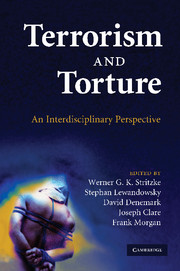Book contents
- Frontmatter
- Contents
- List of figures
- List of tables
- List of contributors
- Preface
- 1 The terrorism–torture link: when evil begets evil
- 2 Torture, terrorism, and the moral prohibition on killing non-combatants
- 3 The equivalent logic of torture and terrorism: the legal regulation of moral monstrosity
- 4 War versus criminal justice in response to terrorism: the losing logic of torture
- 5 Reducing the opportunities for terrorism: applying the principles of situational crime prevention
- 6 From the terrorists' point of view: toward a better understanding of the staircase to terrorism
- 7 If they're not crazy, then what? The implications of social psychological approaches to terrorism for conflict management
- 8 The cycle of righteous destruction: a Terror Management Theory perspective on terrorist and counter-terrorist violence
- 9 Misinformation and the “War on Terror”: when memory turns fiction into fact
- 10 Icons of fear: terrorism, torture, and the media
- 11 What explains torture coverage during war-time? A search for realistic answers
- 12 Reversed negatives: how the news media respond to “our” atrocities
- 13 Terrorism and TV news coverage of the 2001 Australian election
- 14 Terrorism, anxiety, and war
- 15 I'm right, you're dead: speculations about the roots of fanaticism
- 16 Reducing terrorist risk: integrating jurisdictional and opportunity approaches
- Index
- References
1 - The terrorism–torture link: when evil begets evil
Published online by Cambridge University Press: 15 September 2009
- Frontmatter
- Contents
- List of figures
- List of tables
- List of contributors
- Preface
- 1 The terrorism–torture link: when evil begets evil
- 2 Torture, terrorism, and the moral prohibition on killing non-combatants
- 3 The equivalent logic of torture and terrorism: the legal regulation of moral monstrosity
- 4 War versus criminal justice in response to terrorism: the losing logic of torture
- 5 Reducing the opportunities for terrorism: applying the principles of situational crime prevention
- 6 From the terrorists' point of view: toward a better understanding of the staircase to terrorism
- 7 If they're not crazy, then what? The implications of social psychological approaches to terrorism for conflict management
- 8 The cycle of righteous destruction: a Terror Management Theory perspective on terrorist and counter-terrorist violence
- 9 Misinformation and the “War on Terror”: when memory turns fiction into fact
- 10 Icons of fear: terrorism, torture, and the media
- 11 What explains torture coverage during war-time? A search for realistic answers
- 12 Reversed negatives: how the news media respond to “our” atrocities
- 13 Terrorism and TV news coverage of the 2001 Australian election
- 14 Terrorism, anxiety, and war
- 15 I'm right, you're dead: speculations about the roots of fanaticism
- 16 Reducing terrorist risk: integrating jurisdictional and opportunity approaches
- Index
- References
Summary
Joshua Key, a 28-year-old US soldier and father of two, deserted the US army during a two-week leave in the early months of the second Iraq War (2003–). He described his most common duties while in Iraq as “busting into and ransacking homes” (Key, 2007). In the course of these routine duties, Key was troubled by the fact that he never found anything in those homes that appeared to justify “the terror we inflicted every time we blasted through the door of a civilian home, broke everything in sight, punched and zipcuffed the men, and sent them away.” When reflecting on the consequences of his actions, Key concluded that “we, the American soldiers, were the terrorists … The ones we didn't kill had all the reasons in the world to become terrorists themselves.”
What this disillusioned young soldier was doing in his reflections on his war-time experience is what Noam Chomsky (2007) calls looking in the mirror. Chomsky often uses the metaphor of looking in the mirror to remind us that to ask who one is, what one does, and how one is perceived by others, is an essential step toward understanding the dynamics that fuel the vicious cycle of violence and counter-violence. This book intends to provide a careful look into that mirror using the tools of an inter-disciplinary analysis, in order to shed light on what we consider to be a particularly invidious instantiation of the logic of fighting evil with evil; namely, the use of state-sponsored torture in the so-called “war on terror.”
- Type
- Chapter
- Information
- Terrorism and TortureAn Interdisciplinary Perspective, pp. 1 - 17Publisher: Cambridge University PressPrint publication year: 2009



